
Blueberries are one of the healthiest fruits you can give to your baby. These fruits contain plenty of natural carbs to give your baby the energy they need throughout the day.
They are also rich in fiber and natural sugar as well as antioxidants, vitamins, and minerals. With so many nutrients, there is no wonder that parents want to introduce blueberries to their babies' diets.
Jump to:
- Can Babies Have Blueberries?
- When Can Babies Eat Whole Blueberries?
- Do you have to peel blueberries for babies?
- Can Babies Choke on Blueberries?
- Can Babies Eat Blueberries Skin?
- Can A 6-month-old Have Blueberries?
- How Many Blueberries Can A Baby Eat?
- Nutritional Benefits of Blueberries for Babies
- Allergic Reaction/Side-Effect of Blueberries for Babies
- Different Ideas on Blueberry Food for Babies
- Top 5 Baby-led Weaning Blueberry Recipes
- Key References
Can Babies Have Blueberries?
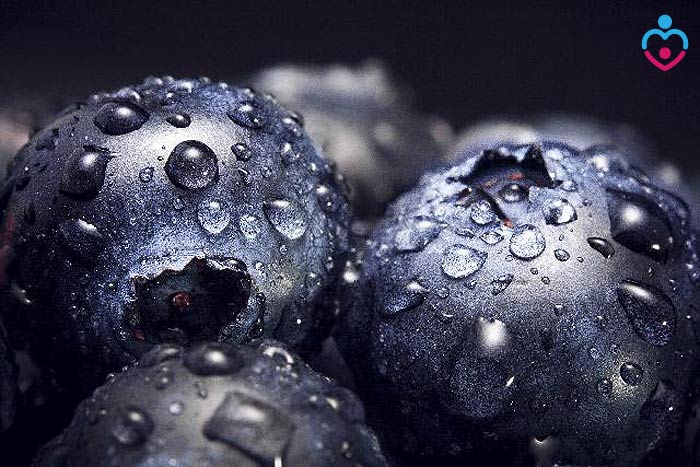
You can add blueberries to your baby's diet as soon as you start introducing solid foods. They are a great choice, to begin with, and you can prepare them in various ways as well. You can start introducing blueberries when your baby turns 6 months old.
Once they get used to more foods, you will be able to use blueberries in various baby-led weaning recipes.
![]()
When Can Babies Eat Whole Blueberries?
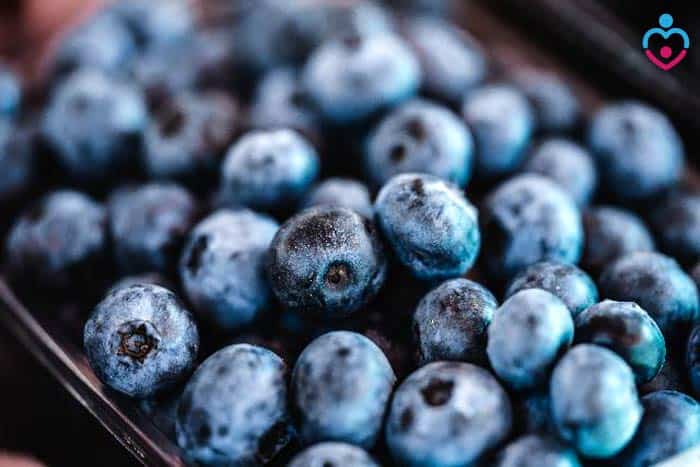
You might think that blueberries present a choking hazard at first sight, but this is not the case. Actually, these fruits are some of the safest you can give to your baby between six months and nine months.
- These fruits have a soft texture, so your baby can easily smash them with their fingers before eating them. And even if they don't do that, they will melt in their mouth and not expose them to any choking hazard.
- So, give your baby a few blueberries to snack on as soon as you introduce solid foods to them. This is a healthier snack than many other options. It will offer them a great variety of nutrients with each blueberry they eat!
- Another common question that new parents ask is - when can babies have blueberries puree? The answer is again 6 to 9 month mark.
Suggested Reading:
![]()
Do you have to peel blueberries for babies?
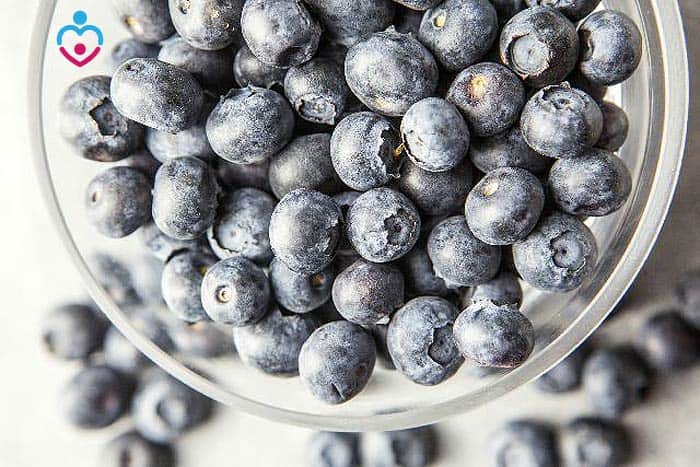
Another common concern of parents is whether or not they should peel blueberries for their babies.
- The truth is that many of the nutrients are found in the blueberry peels as well. Plus, your baby will be able to digest the peels just fine, so you don't have to eliminate them.
- You can just give your baby blueberries raw without preparing them in any way. They will smash them in their little hands and chew them without any problem.
However, you do have to wash the blueberries to eliminate any potential bacteria from them.
![]()
Can Babies Choke on Blueberries?
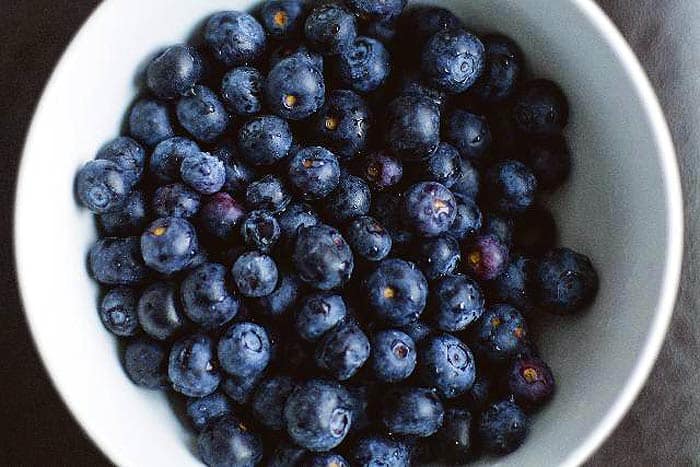
One of the main concerns parents have when it comes to blueberries is the choking hazard.
- The general rule says you don't have to worry about choking hazards when it comes to blueberries. These fruits are soft and comfortable to chew even by very young babies.
- However, if you want to be entirely on the safe side, you can cut the berries in half. This is an excellent trick for six-month-old babies who don't have teeth.
It is also recommended to do that if you have big size blueberries.
![]()
Can Babies Eat Blueberries Skin?
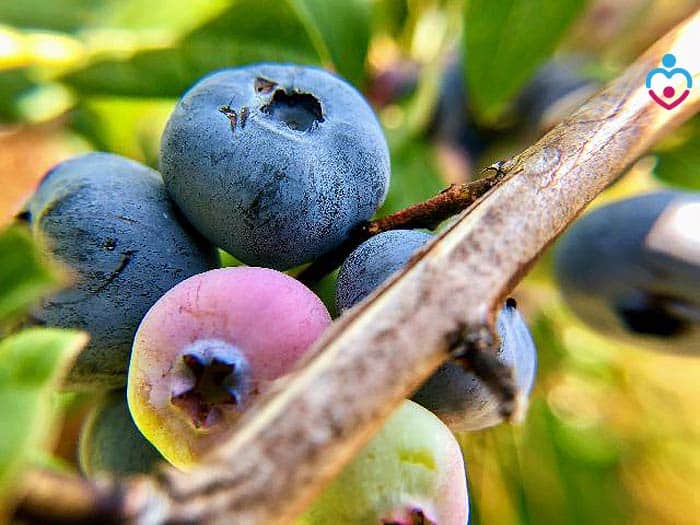
Blueberries skin is one of the richest parts of the fruit when it comes to nutrients. Therefore, you don't have to take the skin off the blueberries before giving them to your baby.
- If you are concerned about digestive issues your child might face, you can steam the blueberries. But this is only a good idea for babies that are preemies or have any other digestive issues.
- For a healthy baby with no digestive struggles, giving them blueberries with skin on them will bring nothing but benefits.
- Even if it is recommended to introduce blueberries once your child is at least six months old, some parents decide to give them this fruit even earlier.
- If your baby is younger than six months and you want to give them a taste of these fruits, removing the peel might be a good idea. At such a young age, babies don't have fully developed digestive systems, so they might not correctly digest the blueberry skin.
![]()
Can A 6-month-old Have Blueberries?
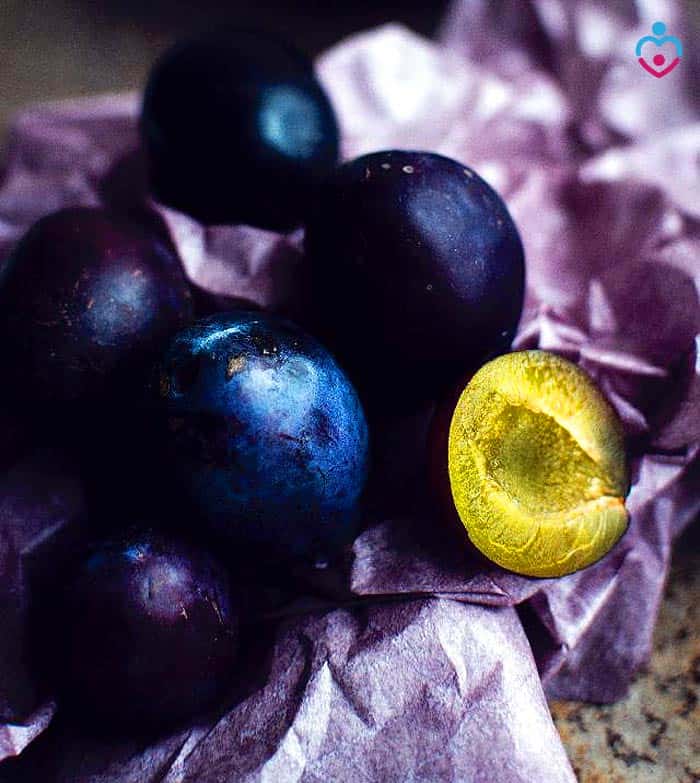
Yes, your baby is ready for blueberries as soon as they turn 6 months old. You can introduce blueberries to their diet raw or as part of different meals.
- Some parents decide to introduce blueberries to their babies' diets even sooner than six months, and as long as the safety measures are respected.
- Make sure to cut the blueberries in half to help your baby swallow them easier.
![]()
How Many Blueberries Can A Baby Eat?
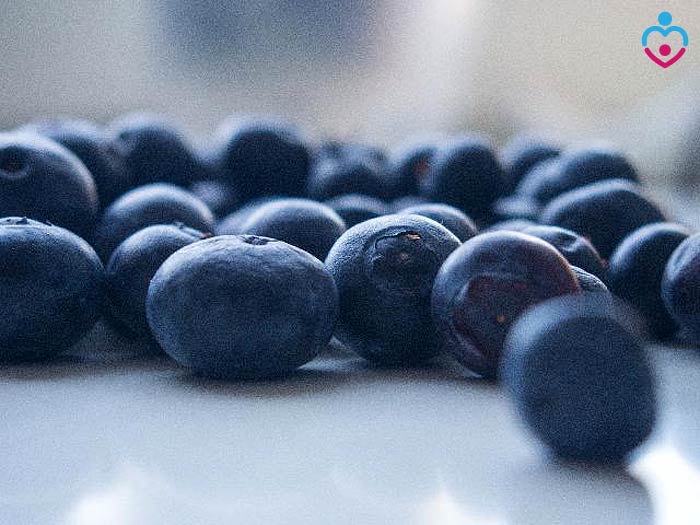
Even if blueberries are healthy and full of nutrients, that doesn't mean you should overfeed your little one with these delicious fruits.
- At first, you should only try with a couple of blueberries when your child starts eating solid foods. If you don't notice any side effects or unpleasant reactions, you can safely increase the number of blueberries per day.
- By the time your baby gets to 1 year old, they can eat up to one cup and even a bit over one cup of blueberries a day with no safety concerns.
![]()
Nutritional Benefits of Blueberries for Babies

As we mentioned, blueberries have a lot of nutrients for your baby to benefit from each portion.
- First of all, blueberries are a great source of natural carbs that your baby needs to grow healthy and stay active. They are rich in natural sugar, so you will not have to add any other sweetener to your child's meals.
- Also, we have to mention the high concentration of fiber that improves your baby's digestive system. The high fiber in blueberries helps with constipation problems as well.
- As micronutrients, blueberries are a good source of vitamin C and potassium, and other minerals that help with brain and nerve development.
- In these fruits, you will also find a complete selection of B vitamins and copper, and manganese, which are essential for developing the bones.
![]()
Allergic Reaction/Side-Effect of Blueberries for Babies
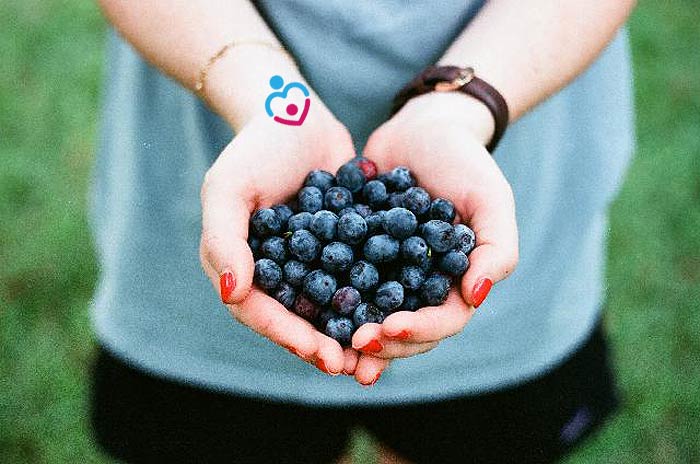
As miraculously healthy as blueberries might be, there are also potential side effects that you need to take into account.
- Blueberries contain salicylates, and this is the substance that could generate allergies in both babies and adults. In every 100 grams of blueberries, you will find up to 27.6 mg of salicylates.
- If your baby is allergic to blueberries, you will notice symptoms such as itching or swelling around the mouth area.
- Babies with this allergy can also develop hives or internal symptoms such as tummy ache, vomiting, or diarrhea. There are also respiratory side effects such as sneezing, coughing, or trouble breathing.
If you notice any of these symptoms in your baby after eating blueberries, call your pediatrician immediately.
![]()
Different Ideas on Blueberry Food for Babies
You can feed blueberries to your baby in various ways as they are flexible for a variety of recipes.
- The best way to give your baby blueberries is raw. This way, the fruits keep all their nutrients, and they can make for a healthy snack any time.
- Another way to add blueberries to your baby's diet is by mixing them in various purees. You will not have to cook these fruits as they blend easily with any other ingredients in their raw form.
- A more complicated way to use blueberries is in different pies or cakes. As long as you consider your baby's potential reactions to all the ingredients, a blueberry pie can be an excellent treat for your toddler.
Suggested Reading:
![]()
Top 5 Baby-led Weaning Blueberry Recipes
If you are looking for easy recipes to introduce blueberries to your baby's diet, here are 5 recipes that you will love.
1. Banana and blueberries puree
Bananas and blueberries go great together, and your baby will love this combination as well.
- You will need 1 banana, ½ cup of blueberries, and vegetal milk of your choice. Instead of vegetal milk, you can easily use water as well.
- Cut the banana into cubes, add it to the blender and blueberries, and a cup of milk or water.
- Blend all the ingredients until you obtain the texture you want according to your baby's taste.
- You can add more or less milk or water according to how thick or creamy you want your puree to be.
- Serve it to your baby fresh. This recipe is perfect for six-month-old babies and older.
Suggested Reading:
![]()
2. Yogurt and blueberries breakfast
Yogurt and blueberries are also an excellent combination for your baby.
- All you need is a cup of yogurt and half a cup of blueberries.
- You can simply mix the berries with the yogurt and serve it to your baby. This is ideal for babies older than one year of age.
- However, if your baby is younger than one year, you might want to blend the yogurt and the blueberries together to obtain the creamy texture they can swallow easier.
Also, keep in mind that you can use baby yogurt and regular yogurt and it is unflavored.
Suggested Readings:
![]()
3. Blueberries and cream cheese spread
Both blueberries and cream cheese are great foods for young toddlers.
- You will need a cup of cream cheese and a cup of blueberries. You can use larger or smaller quantities according to your baby's preferences.
- If you already know that your baby loves cream cheese, you can add more to this food than blueberries.
- Likewise, if your child likes blueberries, you can add more of them to this mix.
This is an excellent recipe for eight-month-old babies, and it can be a delicious breakfast or lunch.
Suggested Reading:
![]()
4. Apple, pear, and blueberry puree
Combining apple with pear and blueberries is a tasty option for all babies. However, you want to combine these three fruits in the same puree once you are sure that your baby can digest each one of them. So, try feeding your baby each fruit individually to make sure they don't develop any side effects before trying this meal.
- You will need 1 small apple, ½ pear, and ½ cup of blueberries.
- Peel and core the apple and the pear before you cut them into little cubes.
- Simmer all the ingredients until they are smooth and blend them for a few seconds. You will obtain a healthy meal for your baby that tastes delicious as well.
Make sure you allow your dish to cool down before feeding it to your baby.
Suggested Reading:
![]()
5. Peach and blueberry cereal
You will need 1 peach, ½ cup of blueberries, and a portion of infant cereal for this recipe.
- Prepare the baby cereal just the way it is recommended on the package.
- Cut the peach into cubes and simmer it along with the blueberries until the fruits become soft.
- Add them to a blender and the prepared cereal and blend all ingredients until you obtain a puree consistency.
- You can add water or milk if you want a more liquid texture. Serve to your baby as soon as the dish cools down.
Suggested Reading:
![]()
Blueberries are outstanding fruits to feed your little one, and they will most likely love all dishes with this food.
If you are concerned about choking hazards, you can always cut the berries in half. However, their soft texture should make them safe for all babies that are ready for solid foods.
![]()
Key References
- "Blueberries for Babies: Nutritional Value, Benefits & Healthy Recipes". Accessed January 20, 2021. Link.
- "Food allergies in babies and young children - NHS". Accessed January 20, 2021. Link.
- "Blueberry Porridge | Weaning Recipes | Start4Life". Accessed January 20, 2021. Link.




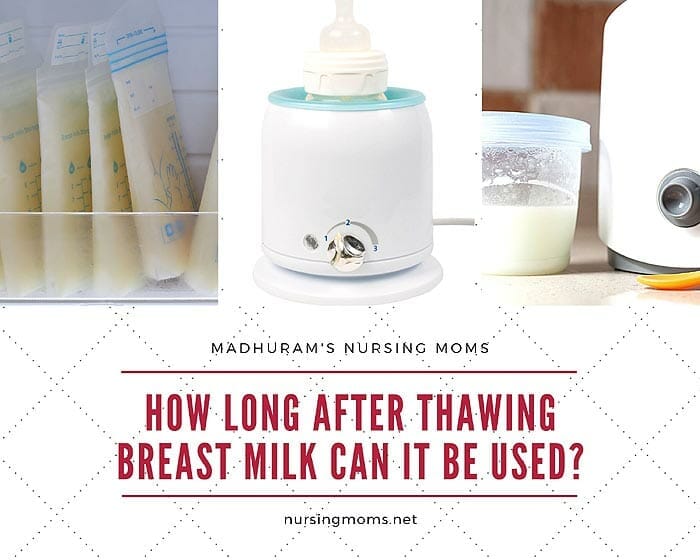
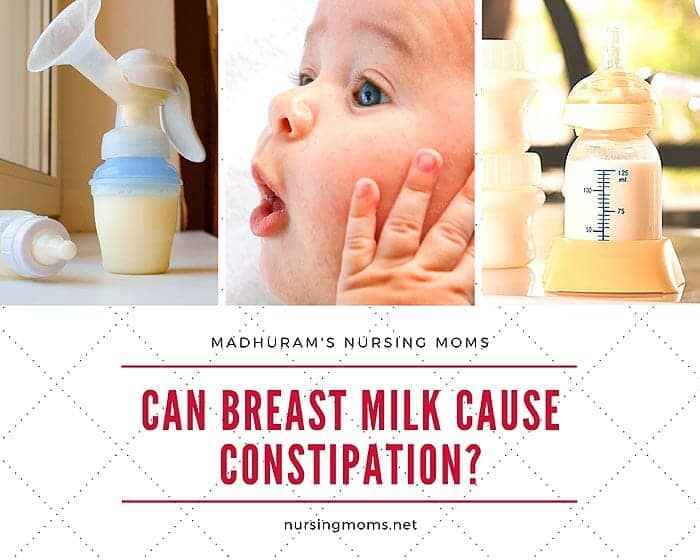

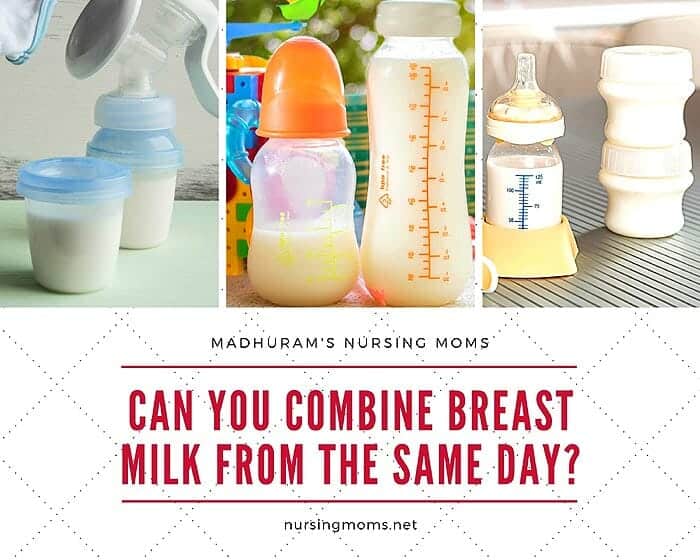


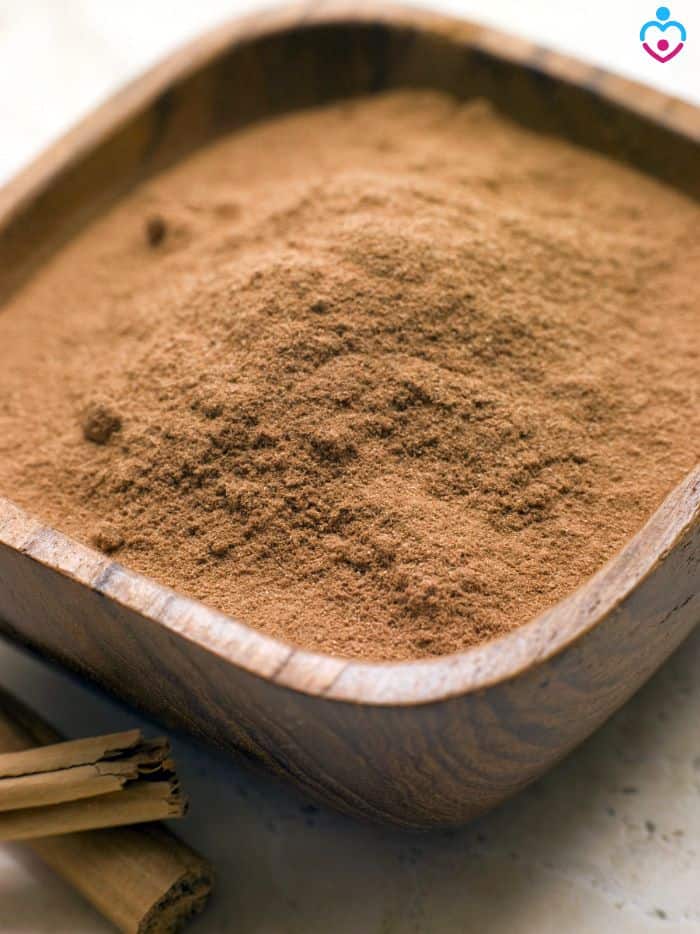
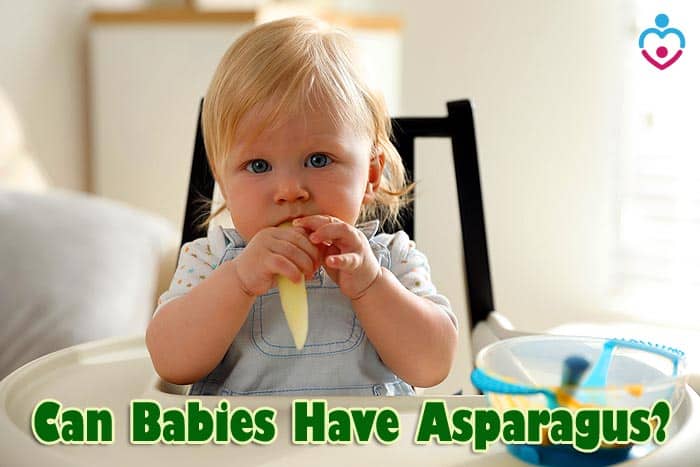

Leave a Reply